Starting an affiliate program is a great strategy to boost sales and grow brand awareness. Imagine having a team of passionate partners promoting your products, and you only pay them when they bring in actual results. That’s amazing, right?
But how can you keep these partnerships under control and ensure promotions stay on track?
The key is creating an affiliate agreement before the collaboration begins.
Crafting a legal document like this isn’t always easy, though. You might stress over missing key rules, breaking laws, or confusing partners with unclear terms.
In this guide, we’ll give you a free affiliate agreement template to ease your worries. We also walk you through the basics of an affiliate contract, show you 11 key elements to include, and provide best practices to write it well.
Plus, you can explore real-world examples of affiliate terms to get ideas for crafting your own.
Potential Revenue with Affiliates (UpPromote)
Estimate the potential revenue when you recruit affiliates: comparing Current Business and Business + UpPromote.
Estimated Impact
Quickly visualize how affiliates can boost your orders and revenue.
Revenue Comparison: Current vs. with UpPromote
The chart illustrates relative revenue growth comparing two scenarios: organic sales vs. organic + affiliate-driven sales.
- Affiliate traffic quality is equal to your current traffic.
- AOV and Conversion Rate remain stable.
- Does not account for churn, refunds, or potential upsell/cross-sell.
To manage your affiliates well and guard against fraud, choose robust affiliate marketing app to track affiliate performance accurately and quickly detect suspicious activities. Check out UpPromote, the top trusted Shopify affiliate solution for growth, with a 4.9/5 rating and over 4,000 reviews, for better your affiliate management process.
Join 115,000+ UpPromote users to take full control of your affiliate program for the best results.
Ready-to-Use Affiliate Agreement Template
Want to create an affiliate agreement but don’t know where to begin? That’s when an affiliate agreement template comes in.
We’ll provide you with a ready-to-use and free affiliate agreement template to save you time and effort. It covers key terms and conditions, so you have a strong base to adjust for your business.
Easily and quickly finish your affiliate marketing agreement with no hassle.
Real Affiliate Terms and Conditions Examples
Curious how real affiliate agreements work in action? These examples from actual terms and conditions reveal what thorough contracts include.
Check them out to get ideas and make your own affiliate agreement stronger and smarter.
1. Amazon Associates affiliate agreement
Amazon runs Amazon Associates, one of the biggest affiliate programs, encouraging people to earn by promoting their huge range of products. Their agreement is packed with clear rules on commissions, tracking, and what affiliates can or can’t do.
Take a look to see how they keep it simple and solid:
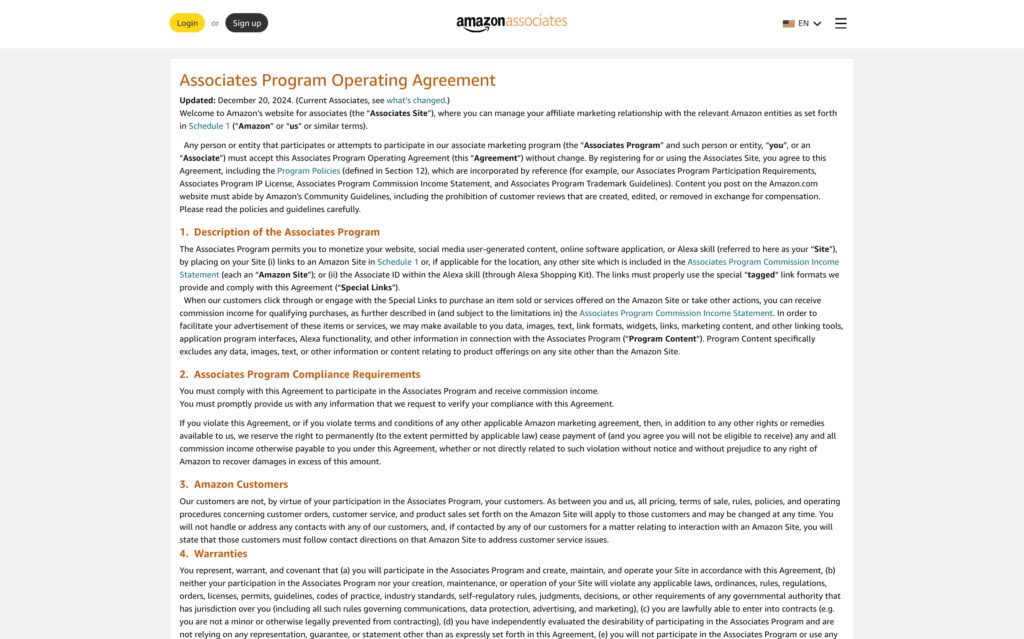
2. HubSpot’s affiliate agreement
HubSpot, a leading marketing tool company, offers an affiliate program for publishers to promote their software and services. Their terms lay out payment details, marketing guidelines, and how they track results in an easy-to-follow way.
Dive into their setup here to borrow some clever ideas:
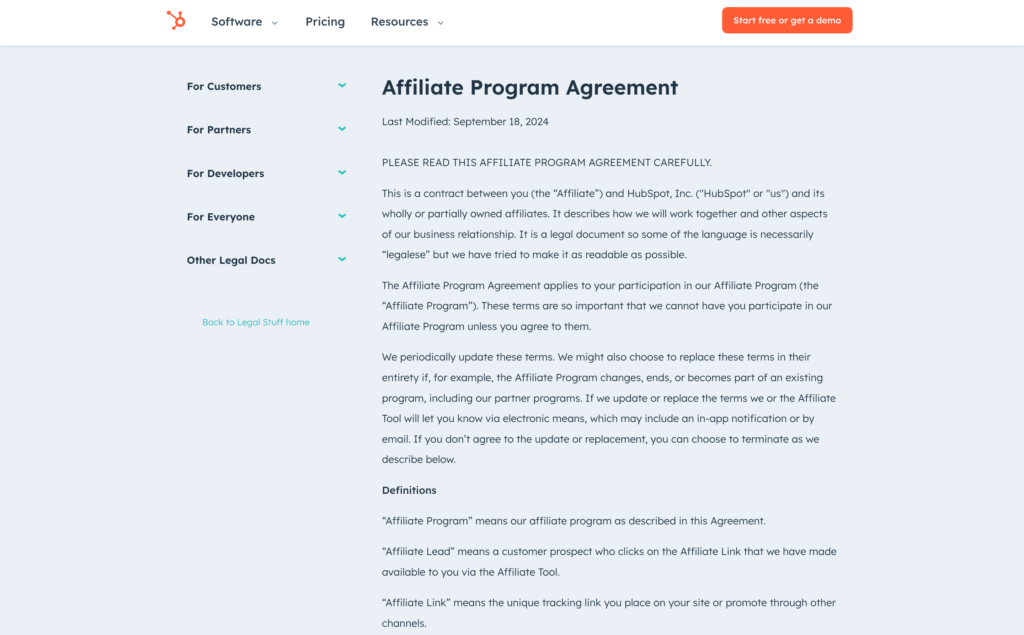
3. Hepper’s affiliate agreement
Hepper, a pet product brand, teams up with affiliate marketers to spread the word about their cool, premium cat furniture. Their program shares transparent terms on earning commissions and sticking to their brand vibe, perfect for a focused niche.
Check out how they do it to inspire your own terms:
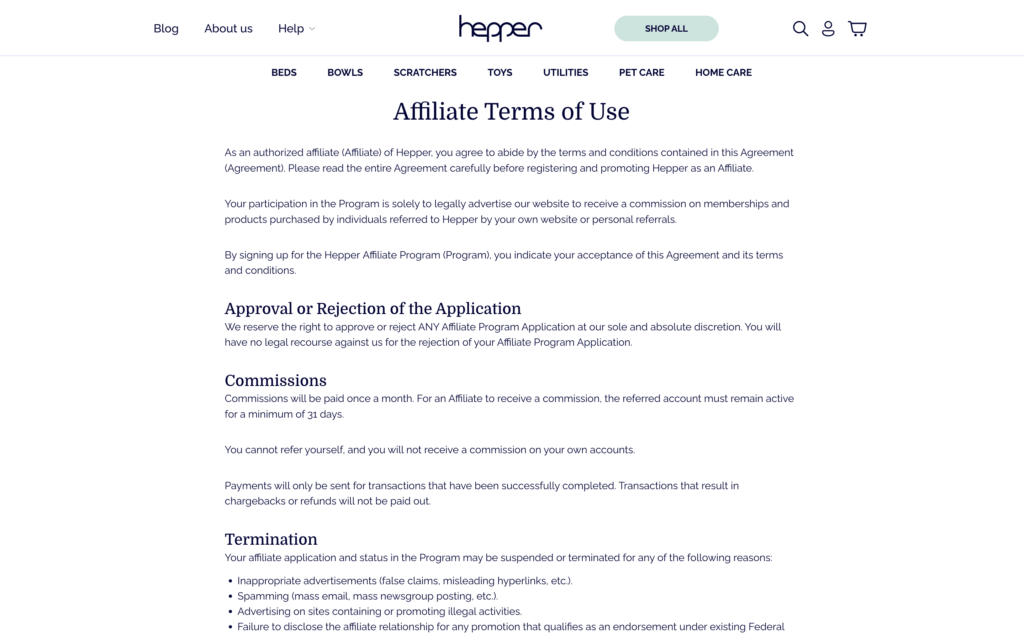
4. TréSkin’s affiliate agreement
TréSkin, a popular skincare company in the US, works with affiliates to share their clean beauty products with more customers. Their agreement covers commissions, promo rules, and partner benefits in a straightforward style that’s easy to grasp.
Review their terms to shape your own deal:
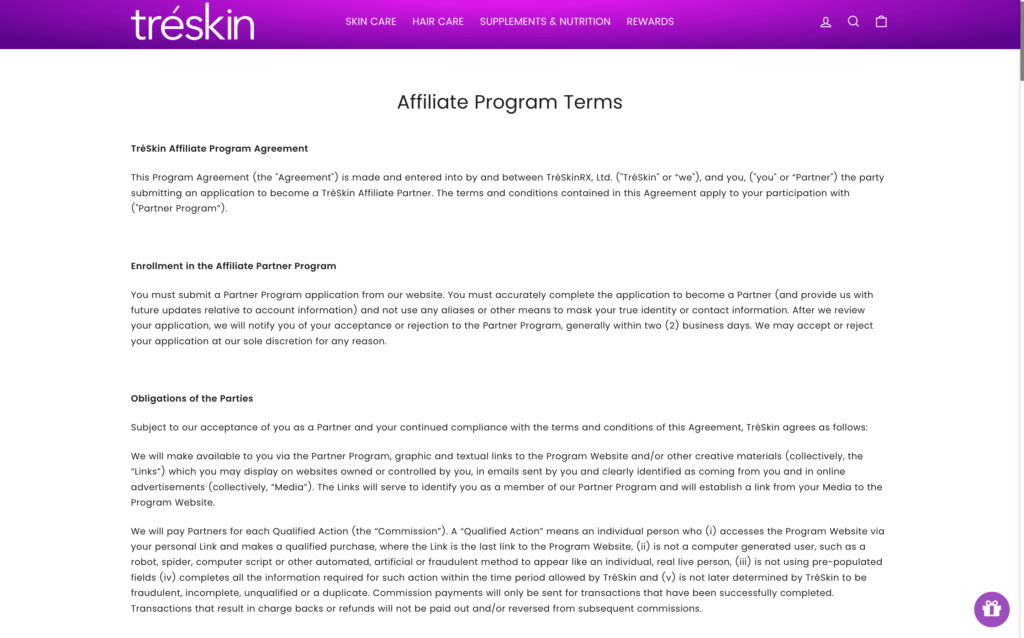
What Is An Affiliate Agreement?
An affiliate agreement is a contract between a business and an affiliate. The affiliate promotes the business’s products or services and earns a commission on results like sales or leads they generate.
The agreement outlines the terms and conditions of the partnership, including the commission structure, responsibilities of each party, and duration of the agreement. It also covers clauses related to intellectual property (who owns or can use the affiliate’s content or the merchant’s logos), confidentiality (keeping sensitive info like sales data or strategies private), and termination (how the deal can end, such as for poor performance or with notice).
When creating an affiliate program, business owners need to craft a clear and detailed affiliate agreement. This task is essential for several reasons:
- Protect brand reputation and intellectual property: The affiliate contract specifies how affiliates promote the company. It keeps promotions in line with core values, follows laws like disclosing affiliate status, and avoids legal or customer trouble. Plus, affiliates are restricted from misusing brand logos, trademarks, and content.
- Clarify expectations and responsibilities: The agreement clearly shows what affiliates have to do, like promoting honestly, and what the brand promises, like giving support or paying on time. It explains how commissions work and sets promotion rules so both sides work together well and don’t get confused.
- Reduce risks and disputes: Clear rules cut down risks like fraudulent affiliate practices or payment disputes. The agreement provides a framework to address issues swiftly and fairly.
- Enhance trust and professionalism: A well-defined agreement fosters a professional partnership, building trust between the brands and their affiliates. It signals reliability and commitment, strengthening long-term relationships.
How to Write an Affiliate Agreement: 11 Key Components to Include
Writing an affiliate agreement might sound tricky, but it’s just putting your deal with affiliates on paper. Think of it as a friendly handshake with rules both sides can trust.
As a merchant, you want to create an affiliate agreement that’s easy to follow, keeps your business safe, and makes affiliates happy to join you. Consider the following elements to put in yours:
Definitions of Terms
Words can get confusing, so explain the big ones up front. Define things like “affiliate,” “commission,” or “promotion” in simple terms anyone can get. This saves headaches later when someone wonders what you meant. It’s like giving affiliates a mini dictionary tailored to your deal. This small step keeps everyone on the same page.
Commission Structure
Affiliates want to know how they’ll earn money, so spell it out clearly.
In this part, you may need to cover the following aspects:
- Commission structure: Tell them how you set up commissions, like a percentage per sale, a fixed amount per lead, or something else.
For example:
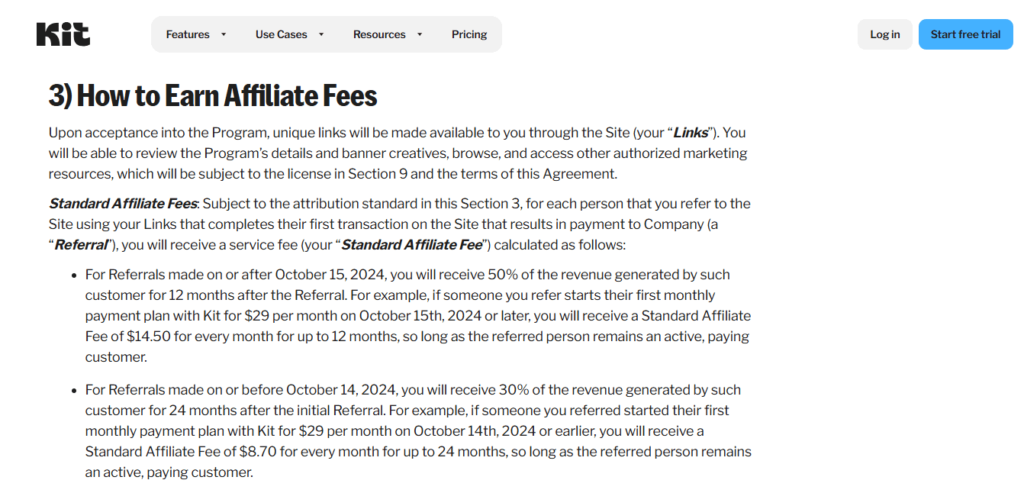
- Cookie duration: Explain how long they have to earn from a click, like 30 days after someone visits your site through their link. It’s their chance to make money, so keep it reasonable.
For example:

- Bonus incentives: Clarify if there are any special bonuses for affiliates who meet certain targets or conditions.
For example:
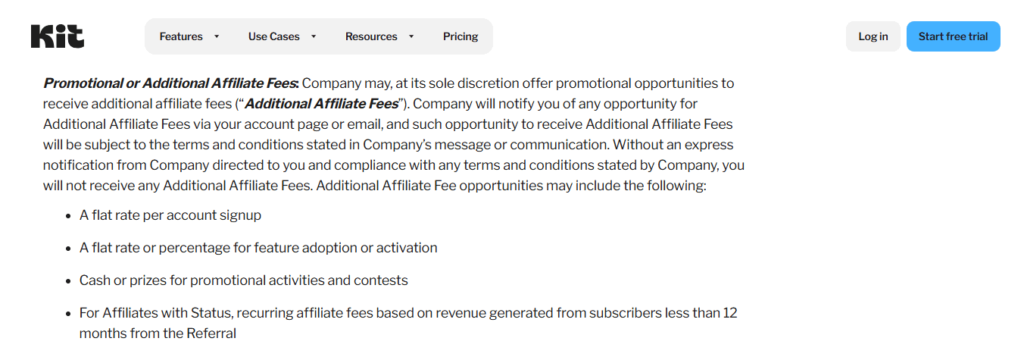
- Criteria for commission eligibility: This rule tells affiliates how to qualify for a commission and what steps they need to hit, such as completed sales with no refunds. It keeps things straightforward and avoids trouble down the road.
For example:
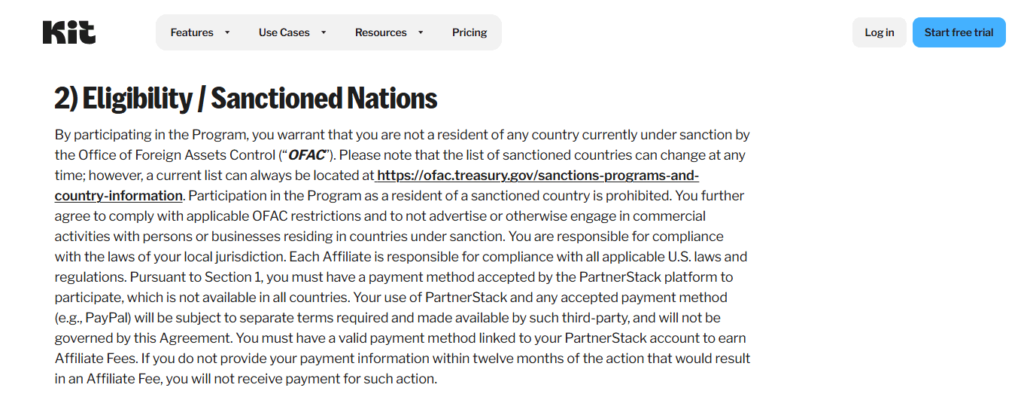
- Handling chargebacks or refunds: Tell them what happens if a sale flops or gets refunded, such as taking that commission out of their next payout.
For example:

Payment Terms
Nobody likes waiting for cash, so make the payment details as clear as possible. Tell them how often they’ll get paid, like every week or every month, and stick to a schedule they can rely on. Say how you’ll send the commissions—maybe through PayPal or bank transfer. Pick options that work for most people and let them know upfront.
If there’s a minimum they need to hit, like $50, before getting paid, spell it out to keep things smooth. Make it clear what currency you’re using, like dollars or euros, to avoid any mix-ups.
Warn them about any delays, like waiting for sales to finalize, to keep them from feeling disappointed. This part shows you’re reliable, and affiliates will value your honesty.
Responsibilities of the Affiliate
Tell affiliates what you expect from them in plain and simple words. List the promotion methods they can use, such as websites, social media, or emails, to share your products. Specify any prohibited activities, like spam or misleading ads, so they know what to avoid.
If you have rules for their content, such as matching your brand’s voice or skipping specific topics, lay those out plainly. Make sure they understand and agree to comply with disclosure requirements (e.g., FTC guidelines regarding affiliate links).
Responsibilities of the Merchant
In the affiliate agreement, you need to lay out your brand’s role in this partnership. It’s a way to show affiliates the teamwork is supportive, fair, and you’re right there with them.
Here’s what you can say you’ll do:
- Provide affiliates with marketing materials, such as banners, text links, or other creative assets.
- Give them product samples or access to try your service.
- Tell them what support you’ll offer, like answering questions or fixing problems quickly.
- Explain how you’ll track their performance and share reports to keep things open. Let them know if you use affiliate marketing software or third-party networks to track sales, and show how they can check their earnings.
Duration and Termination
This section is all about letting affiliates know how long the agreement lasts and how it can end. It’s like setting the timeline and exit rules for your partnership. Here’s what to think about:
- Term length: Specify the duration of the agreement. Tell affiliates if the deal runs for a set time, like one year, or keeps going until someone stops it.
- Termination clause: Outline the conditions under which either party can terminate the agreement. For example, breach of contract, inactivity, or failure to meet performance targets.
- Notice period: Define the amount of notice required for termination. For instance, 30 days in writing, to keep things smooth and fair.
- Effect of termination: Make clear what happens after termination, like paying out any leftover commissions or wrapping up loose ends.
Legal and Compliance Provisions
Here’s where you cover the legal stuff to keep your affiliate partnership on the right track. Ask both sides to follow advertising laws, data protection regulations, and industry standards to avoid trouble. Set up a process for dispute resolution, like arbitration or mediation, to sort out any issues.
Specify which jurisdiction’s laws will govern the agreement, such as “This follows California law,” for clarity. Include an indemnification clause so one side covers the other in case of legal claims or losses. Make sure affiliates follow Federal Trade Commission (FTC) guidelines by disclosing their role, and address data privacy to meet laws like General Data Protection Regulation (GDPR) or California Consumer Privacy Act (CCPA).
Intellectual Property Rights
This section clarifies the ownership and use of intellectual property in your affiliate agreement to prevent misunderstandings. State clearly that your business retains ownership of all marketing materials, brand logos, and any content created by affiliates under this partnership.
Grant affiliates a limited license to use these materials for promotional purposes, with specific conditions to protect your brand. Specify that they cannot modify the materials or use them beyond the scope of the agreement, ensuring your intellectual property remains secure. This approach maintains control while allowing affiliates to promote effectively.
Reporting and Performance Metrics
This part outlines how performance is tracked and reported in your affiliate agreement to ensure transparency. Specify what performance data affiliates can access, such as conversion rates and click data, to monitor their progress. Provide regular reports to help them understand their results and improve their efforts.
Indicate whether you, as the merchant, reserve the right to audit their activities to confirm compliance with the agreement. Explain that this may involve reviewing their data periodically to maintain accuracy and trust. This process supports a clear and reliable partnership for both parties.
Confidentiality
In this area, you outline the need to protect sensitive information for clarity and trust. Include a confidentiality clause requiring you and your affiliates to keep business strategies, customer data, and financial records confidential during the collaboration.
State the duration of these confidentiality obligations, such as throughout the agreement and for a specified period after it ends, like two years. This rule keeps your company’s details secure even after the deal is over.
Signatures
End with a space for you and the affiliate to sign. This is an essential component to make the contract legally binding. Note that the agreement takes effect only when each side has signed.
Best Practices for Creating an Effective Affiliate Agreement
A well-constructed affiliate agreement is crucial for building a successful and transparent partnership. Here are some practical tips to ensure it stays robust, fair, and legally sound:
Use Clear and Concise Language
Write your agreement in simple language. Make sure everyone can understand it, no matter their legal background.
- Avoid legal jargon and complex terms to promote understanding.
- Define terms and conditions precisely with concise, direct statements.
- If specific legal terms are necessary, provide clear definitions within the agreement itself.
Be Specific and Detailed
You should describe the partnership in detail to prevent misunderstandings.
Here’s how:
- Specify all key elements, such as commission structures, payment schedules, and responsibilities of each party.
- Include examples or scenarios to clarify important provisions.
- Detailed terms reduce the likelihood of disputes and enhance cooperation.
Consult Legal Counsel
Before finalizing your agreement, it’s important to consult a legal professional. This step ensures the contract is valid.
Select an expert in contract law to examine the document carefully. This review confirms it complies with applicable laws and spots potential legal risks. Legal advice also helps adjust the agreement to fit your business needs and protect your interests.
Regularly Review and Update
The affiliate marketing landscape is constantly evolving. Regularly review your affiliate agreement to ensure it remains up-to-date.
You can update the document to reflect any changes in your business practices, legal requirements, or industry standards. You can also schedule a review every six months or yearly to keep the contract relevant and effective.
The Bottom Line
Building a strong affiliate program takes a good affiliate agreement to keep things running smoothly and safely. This article gives you a free template, easy tips, and real examples to make writing less of a headache.
With these in your hands, you can stop worrying about legal messes or unclear rules and feel good about your setup. Plus, using a powerful and reliable affiliate tracking app can help you monitor your affiliates closely and stop fraud before it starts.







